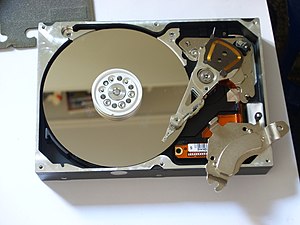 Image via Wikipedia
Image via WikipediaThe more you use your computer, the more the files become fragmented and spread around your hard drive in bits and pieces. The more fragmented your hard drive is, the slower the performance. Defragging your hard drive consolidates the pieces into single contiguous sections or blocks for faster access.
Windows has a free Disk Defragmenter. You might want to run the defragmenter before you go to bed as it takes a long time to complete. You should be logged on as an Administrator.
Go to START, then ALL PROGRAMS, ACCESSORIES, SYSTEM TOOLS, DISK DEFRAGMENTER. Highlight the hard drive you want to Defrag, usually the C: drive. If you have more than one drive, you can defrag them all, but only one at a time. Press the Analyze button and Defrag will tell you whether or not the drive needs to be defragged. Click on the Defrag button to begin the Defrag process.
You should do this at least once a month. More, if you are a heavy pc user.
For alternate methods of using Disk Defragmenter, check the Microsoft Knowledge Base below:
http://support.microsoft.com/kb/314848

